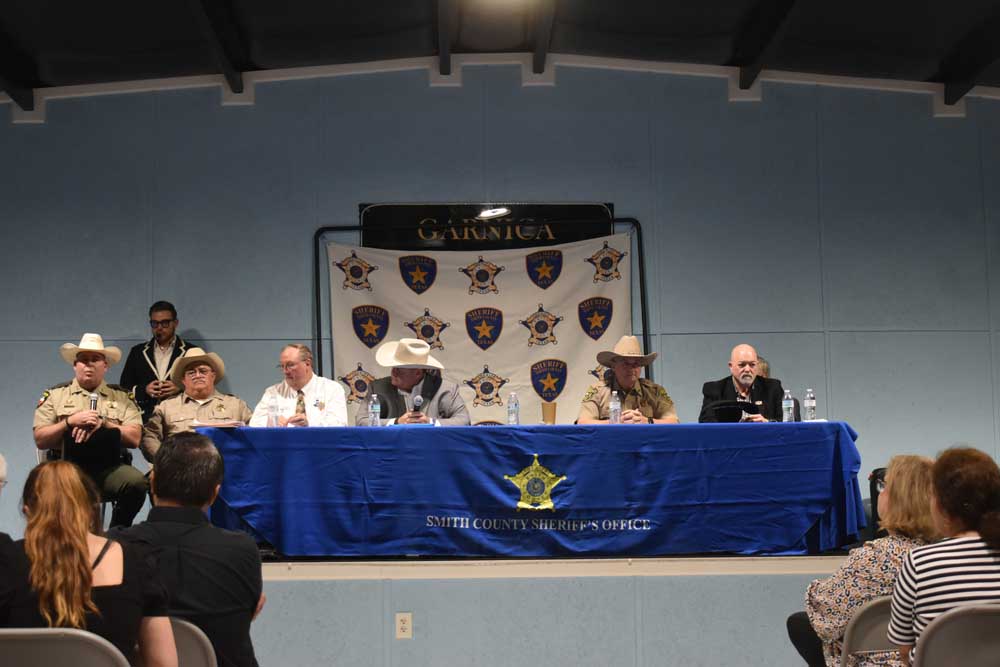East Texas residents express concerns about deportation while sheriffs aim to lessen fears
Published 5:45 am Saturday, February 8, 2025

- A panel of East Texas sheriffs answer questions about immigration on Thursday afternoon at Garnica Event Center in the El Norteño Mexican Restaurant in Tyler. (Raquel Villatoro/Tyler Morning Telegraph)
As immigration policies are strengthened under President Donald Trump’s administration, a number of Smith County advocates are concerned for their friends who may have undocumented family members.
“It doesn’t matter where we were born, what country we came from,” said Shonda Marsh, a candidate for the City of Tyler District 3 council seat. “We’re here to work. We’re here to create a better life for our family and our friends.”
Trending
Marsh was among the advocates and other East Texas residents seeking to learn more about the policies in local counties as Smith County Sheriff Larry Smith hosted a panel discussion Thursday at the Garnica Event Center in the El Norteño Mexican Restaurant in Tyler. The panelists, including sheriffs from neighboring counties, discussed how their respective offices are operating with increased immigration enforcement under Trump.
Attendees asked questions about the impact of ICE policies and sought to ease their fears about deportation while learning more about individual rights. Some left with more questions, while others appreciated efforts to ease fears and rumors ignited on social media.
Concerns were raised about sensitive locations, such as hospitals, schools and churches, with people questioning whether these places would be protected from Immigration and Customs Enforcement (ICE) deportation efforts.
Marsh asked the panel about the healthcare sector, specifically whether a co-worker with differing views could report an undocumented patient to ICE.
Border Czar Tom Homan confirmed to Smith that ICE will not target churches, hospitals or schools, unless individuals at those locations have been accused of serious crimes or are harboring someone who has.
“We’re not going into hospitals arresting people. There has to be some reason behind that,” Smith said. “Most [people being targeted] are the 600,000 gang members wreaking havoc.”
Trending
Smith made it clear that anyone — whether a U.S. citizen or an undocumented immigrant — who commits a serious crime, particularly a violent one, will be taken into custody.
Tyler resident Alondra Villalobos said teachers in Tyler ISD have told her that some students have been attending school sporadically or missing days entirely since Trump’s new administration began. Some students have reportedly not been seen at all, and despite attempts to contact them, their whereabouts remain unknown, causing concern among educators, she said.
Concerns were raised about whether schools would act as a line of defense for children, especially with the uncertainty surrounding ICE actions, despite assurances from Homan that schools and churches are not targeted.
The question remains about the broader authority granted to ICE under the current administration. There is a desire to hear from school boards about how districts would respond if ICE were to enter schools.
“Are we going to use the kids as a way to bait the parents,” Villalobos said. “What kind of trauma would that put on a child?”
Another attendee, who is white, talked about white students reportedly bullying Latino students by calling them names, picking fights and causing disruptions in the classroom. The attendee urged officials to engage in dialogue with schools to address bullying and foster greater empathy for children in difficult situations through no fault of their own.
Smith agreed to speak with Smith County school superintendents about the bullying issue and appreciated the attendee’s concern. He emphasized the importance of mitigating bullying in schools as a way to prevent juvenile delinquency and, in turn, adult delinquency.
Smith also talked about how he set the threshold for ICE involvement in Smith County at driving while intoxicated or a higher offense. He also outlined the 287(g) jail enforcement program, which allows officers to check the immigration status of those already arrested.
During traffic stops, like speeding, individuals will not be arrested by Smith County deputies solely for that offense. Deputies are not going to ask for a person’s green card or immigration status in these situations, Smith said. However, if the person attempts to flee a traffic stop, that becomes a felony, and ICE would be involved.
The key takeaway, Smith said, is to follow the law. Anyone obeying the law should feel safe in their daily lives, whether they’re going to work, school or the grocery store.
Since 2017, the 287(g) agreement has been in place in Smith County. “So we already know that the county works hand in hand to expedite ICE or people that are detained and then will have an ICE hold,” Tyler resident and community advocate Emily Pinal said. “This is a county that is, like [Smith] said, modeling the show for East Texas.”
The program will soon expand, enabling local agencies to assist in ICE operations, and the Smith County Sheriff’s Office will participate, Smith said.
ICE is targeting around 600,000 undocumented individuals from more than 100 countries, not just Mexico, for deportation, Smith added. These individuals failed to check in after being released on personal recognizance bonds and have violated local, state or federal laws.
Additionally, ICE is trying to locate about 300,000 children whose whereabouts are unknown.
For now, Smith County is not a priority for federal immigration enforcement, as the government is focusing on larger cities, Pinal said. While the county is not currently at risk, Smith has said he will follow whatever directives come from the federal administration if the situation changes.
“We’re not there right now,” Pinal said. “But if it came down to it, he’s gonna model whatever he’s being told by the federal administration to follow.”
Collateral arrests were a point of debate at the panel, with many people asking questions and seeking clarity. These arrests refer to ICE checking the immigration status of people not directly involved in criminal activity because they are associated with known undocumented criminal law violators.
If someone is at work in a facility, not everyone will have their status checked just because they are inside the facility, Smith said. However, if they are in another location outside hanging around someone ICE is targeting, their status will be checked. In this instance, even if the person doesn’t have a violent or serious criminal record, ICE will take them into custody if they are found to be undocumented.
Smith encourages everyone to limit their association with serious criminals.
“Should you have housemates, relatives or friends living with you, consider separating from them or ask them to surrender themselves to law enforcement,” Smith said.
Immigration advocates are advocating against these collateral arrests.
“We’re advocating not to do that,” said Jose Sanchez, an immigration lawyer based in Longview. “We’re gonna hear about that, it’s just a numbers game, those things are gonna happen. I think that’s what we’re trying to fight for. You can’t put them — everybody together — you need to go after the priority ones.”
White House Press Secretary Karoline Leavitt stated in a January briefing that undocumented immigrants are criminals. However, Sanchez disagrees, clarifying that being undocumented is a civil violation, not a criminal one.
“Just because they’re here undocumented — because you’re here without status — doesn’t mean you’re a criminal,” Sanchez said.
Marsh noted that many local construction sites were empty Monday as Tyler workers observed a Day Without Immigrants.
“There were no people working,” she said, adding that some of her colleagues also kept their children home from school that day in silent protest.
Some are feeling unheard and unfairly targeted and believe economic pressure — pausing work or boycotting businesses — can be an effective way to demand attention.
“These are people I have a kinship with. I grew up with Hispanic people. I’ve dated Hispanic people. My teachers, mentors in my life, are Hispanic,” Marsh said. “The majority of the people that he’s talking about don’t purposefully get in trouble.”
Marsh felt the people who needed the discussion most may not have attended Thursday’s panel, likely out of fear. However, those who did show up have voices that needed to be heard — and they were. Still, questions remain.
“What I took away is that I have more questions. I have way more questions than I do answers,” Marsh said. “I definitely think that we should be able to have another panel discussion with a more diverse group of panelists.”
The community is encouraged not obtain Know Your Rights red cards and actively use them. These cards can be found at many local businesses, nonprofits and attorney’s offices, including immigration attorney Ginger Young’s office at 1021 E SE Loop 323 Suite 200 in Tyler, and Sanchez’s office at 507 N. Green St. in Longview. Red cards can also be printed or digitally downloaded, in multiple languages, online at www.ilrc.org/red-cards-tarjetas-rojas .
It’s important to understand legal rights, request a lawyer when needed and seek both criminal and immigration legal counsel.
Sanchez reiterated that under the Constitution, undocumented persons have the right to remain silent and refuse searches without a warrant. He advises clients not to open the door for ICE unless they present a warrant, adding that if ICE has one, they will use forced entry.
“Make them knock it down,” Sanchez said. “Why are you gonna voluntarily open it and expose yourself to a potential problem?”
Pinal is concerned about whether law enforcement officers are properly trained and informed on immigration policies and procedures. She had questions about how the Smith County Sheriff’s Office, for example, ensures officers follow Smith’s policies, avoid profiling and if they understand the Know Your Rights materials.
She felt Smith didn’t give a clear answer on how the department holds officers accountable to these protocols, she said.
Pinal encouraged the community to stay engaged and informed by reaching out to nonprofits and lawyers for accurate resources. She said knowing and practicing their rights while staying involved in local discussions is important.
“Right now, they’re not going into schools, they’re not going into hospitals. We’re just not there,” Pinal said. “We’re not at that point, but it doesn’t hurt to be prepared and be proactive.”
The panel also included sheriffs from Wood, Upshur, Rusk, Morris, Hopkins and Franklin counties, as well as the executive director of the Sheriff’s Association of Texas.






